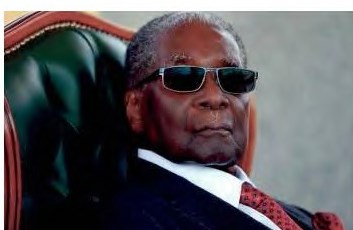HARARE, Zimbabwe (AP) – Former Zimbabwean leader Robert Mugabe, an ex-guerrilla chief who took power when the African country shook off white minority rule, and presided for decades while economic turmoil and human rights violations eroded its early promise, died Sept. 6 in Singapore. He was 95.
Mugabe enjoyed strong support from Zimbabwe’s people soon after he became the first post-colonial leader of what had been British-controlled Rhodesia.
Often violent farm seizures from whites who owned huge tracts of land made him a hated figure in the West and a hero in Africa.
His successor, President Emmerson Mnangagwa, tweeted word Friday that an “icon of liberation” had died. Mnangagwa, a long-time loyalist until Mugabe dismissed him from his Cabinet, named Mugabe as a national hero, Zimbabwe’s highest posthumous honor.
He said the nation would observe an official mourning period for its late leader, “a great teacher and mentor” and a “remarkable statesman of our century.”
Mugabe was defiant throughout his long life, railing against the West for what he called its neo-colonialist attitude and urging Africans to take control of their resources – a populist message that was often a hit, even as many nations on the continent shed the strongman model and moved toward democracy.
A target of international sanctions over the years, Mugabe nevertheless enjoyed acceptance among peers in Africa who chose not to judge him in the same way as Britain, the United States and other Western detractors.
“They are the ones who say they gave Christianity to Africa,” Mugabe said of the West during a visit to South Africa in 2016. “We say: ‘We came, we saw and we were conquered.’”
Even as old age took its toll and opposition to his rule increased, he refused to step down until the pressure became unbearable in 2017 as his former allies in the ruling party accused him of grooming his wife, Grace, to take over – ahead of long-serving loyalists such as Mnangagwa, who was fired in November 2017 before returning to take over with the help of the military.
UNREFORMED LAND
After the fighting between black guerrillas and the white rulers of Rhodesia, as Zimbabwe was then known, ended, Mugabe reached out to whites. The self-declared Marxist stressed the need for education and built new schools. Tourism and mining flourished, and Zimbabwe was a regional breadbasket.
However, a brutal military campaign waged against an uprising in western Matabeleland province that ended in 1987 augured a bitter turn in Zimbabwe’s fortunes. As the years went by, Mugabe was widely accused of hanging onto power through violence and vote fraud, notably in a 2008 election that led to a troubled coalition government after regional mediators intervened.
Mugabe was re-elected in 2013 in another ballot marred by alleged irregularities, though he dismissed his critics as sore losers.
Amid the political turmoil, the economy of Zimbabwe, traditionally rich in agriculture and minerals, deteriorated. Factories were closing, unemployment was rising and the country abandoned its currency for the U.S. dollar in 2009 because of hyperinflation.
The economic problems are often traced to the violent seizures of thousands of white-owned farms that began around 2000. Land reform was supposed to take much of the country’s most fertile land – owned by about 4,500 white descendants of mainly British and South African colonialera settlers – and redistribute it to poor blacks. Instead, Mugabe gave prime farms to ruling party leaders, party loyalists, security chiefs, relatives and cronies.
Zimbabwe’s main opposition leader, Nelson Chamisa, said he was “mourning with the rest of Africa” over the death of Mugabe in the African tradition of Ubuntu, or humanity toward others, calling him one of Zimbabwe’s founding fathers and a freedom fighter.
However, Chamisa, who leads the Movement for Democratic Change, also acknowledged the pain over “decades of political disputes” surrounding his governance.
MIXED MEMORIES
On the streets of Harare, the capital, people gathered in small groups Friday and discussed Mugabe.
“I will not shed a tear, not for that cruel man,” said Tariro Makena, a street vendor. “All these problems, he started them and people now want us to pretend it never happened.”
Others said they missed him.
“Things are worse now. Life was not that good but it was never this bad. These people who removed him from power have no clue whatsoever,” said Silas Marongo, holding an axe and joining men and women cutting a tree for firewood in suburban Harare. They needed the wood to beat severe electricity shortages that underline the worsening economic situation.
Mugabe lacked the easy charisma of Nelson Mandela, the anti-apartheid leader and contemporary who became South Africa’s first black president in 1994 after reconciling with its former white rulers. But he drew admirers in some quarters for taking a hard line with the West, and he could be disarming despite his sometimes harsh demeanor.













No Comment